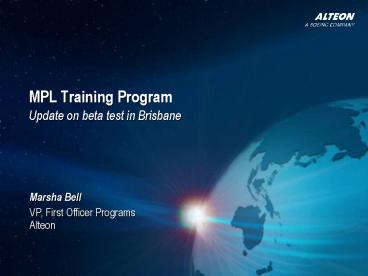MPL Training Program - PowerPoint PPT Presentation
1 / 31
Title:
MPL Training Program
Description:
MPL Training Program. Update on beta test in Brisbane. Marsha Bell. VP, First Officer Programs ... Same skills, knowledge, competencies, arguably better ... – PowerPoint PPT presentation
Number of Views:590
Avg rating:3.0/5.0
Title: MPL Training Program
1
MPL Training Program
- Update on beta test in Brisbane
Marsha Bell
VP, First Officer Programs Alteon
2
Last Year in Singapore
3
Airlines challenge
4
ICAOs solution
5
MPLs value
6
ICAOs MPL is a timely solution
- Because the world needs more pilots now
- Because training can be lengthy and inefficient
Traditional Training 2 ½ yr.
Advanced Crs
Type Rating
Ab Initio
Initial Operating Experience
Initial Operating Experience
ATPL
ATPL
6mo. Grd School Sim
12 mo. Jet Sim A/C
University
University
- Same skills, knowledge, competencies, arguably
better - Same privileges as heavy jet-rated CPL pilot with
the exception of PIC in a single pilot airplane
7
Multi-Crew Pilot License Training
Type Rating
Jet Indoc
CPL
Integrated TEM Principles
M/E
Inst
PPL
8
Status Quo Assumptions
More time in training
better quality pilots
More time flying
more pilot proficiency
Single pilot training
ready for F/O duties
9
Better training
Relevant time flying
Crew training
10
Beta Test Progress Report
11
IATA Global MPL Initiative
12
IATAs MPL Involvement
13
IATA supports MPL
14
Global MPL Initiative Roadmap
15
IATA Global MPL Working Panel
16
Timetable Revisions
MPL qualified First Officers Summer 2008
Jan
Feb
Mar
Apr
May
Jun
Jul
Aug
Sep
Oct
Nov
Dec
Jan
Feb
Mar
Apr
May
Jun
Jul
Aug
2007
2008
17
Cadets in MPL Beta Program
18
Core Training Footprint
1st Flight
1st Night Flight
19
MPL Core Phase of Training
Integrated TEM Principles
20
MPL Basic Phase of Training
Integrated TEM Principles
21
Basic Single Engine
101 Take-offs 13 precision approaches 32
non-precision approaches
- Basic MPL pilots will have 200 DA40 flight hours
- 83 hours in DA40
- 117 hours in DA40 FTD
- 600 hours of aeronautical experience
- 96 trips as PF crew member
- 32 trips as PM crew member
22
Does MPL have enough flight time?
- CPL/IR/ME pilots have about 250 hours prior to
jet indoc - Approx. 50 hours ME
- Approx. 200 hours SE
- CPL/IR/ME pilots will have little or no previous
crew or airline discipline
- Basic MPL pilots will have 200 DA40 flight hours
- 83 hours in DA40
- 117 hours in DA40 FTD
- 600 hours of aeronautical experience (266 x 3)
- 96 trips as PF crew member
- 32 trips as PM crew member
- Basic MPL pilots employ airline discipline and
train as crew, except solo
Enough is measured in pilot performance for the
MPL program
23
Basic Multi-Engine
Intro to Multi-Engine and Jet Operations 737NG
Systems and Normal Procedures 33 missions each as
PF, PM, PO
24
MPL Intermediate Phase of Training
Integrated TEM Principles
25
MPL Advanced Phase of training
Integrated TEM Principles
26
Advanced Training Footprint
Standard Alteon Type Rating Course
Pilot Flying 345.75 hrs Pilot Monitoring 255
hrs Pilot Observing 372 hrs
27
Is MPL Safe?
The answer is YES, likely safer!
- But there are legitimate concerns
- Does this shorter program take shortcuts?
- Is the sim a valid replacement for the airplane
time? - Will MPL pilots be prepared for emergency command?
28
Does MPL take shortcuts?
- MPL Efficiencies
- No unnecessary learning means no unlearning
- Building airline and crew habits from the
beginning - Competency based training ensures every flight is
a learning opportunity - No shortcuts in pilot responsibilities
- Aviate
- Navigate
- Communicate
- Oversight and phased implementation
29
Can the sim replace airplane time?
- Simulator training is proven
- Zero flight time type ratings
- Controlled environment ensures training
objectives are met - Pure environment allows pilots to see natural
consequences of poor decision making - Manage task loading to build competency
30
Will MPL pilots be prepared for emergencies?
Will captains need to compensate for FOs?
- Threat and error management integral to MPL
- LOSA, checklist, other airline SOPs are skills
and habits introduced from earliest flight
lessons - Effective crew communication developed throughout
training program - ATP level skills, knowledge and competency
required for MPL - Airline experienced pilots will be instructors in
MPL
31
Alteon MPL Jet-Ready Training Philosophy
- Provide vertically integrated, airline-specific
training program - Teach the relevant lessons to develop the right
skills needed to be a competent, confident First
Officer - Progress checks to ensure competency on all
maneuvers, skills and teaching points - Integrate glass cockpit and Flight Management
Systems operations into core flying skills - Focus on multi-engine / IFR in high workload
environment - Utilize simulation devices
- Deliver pilots who are prepared for first officer
duties































